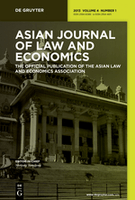
Asian Journal of Law and Economics
Scope & Guideline
Innovating Insights at the Intersection of Law and Economics.
Introduction
Aims and Scopes
- Law and Economics Integration:
The journal focuses on integrating legal frameworks with economic theories, aiming to elucidate how legal principles impact economic behavior and efficiency. - Empirical Research:
A strong emphasis on empirical studies that analyze real-world data to assess the effectiveness of laws and regulations, providing evidence-based insights for policymakers. - Comparative Legal Analysis:
The journal often includes comparative studies that analyze legal systems across different jurisdictions, highlighting the implications of various legal structures on economic performance. - Policy Implications:
Research published in the journal frequently discusses the implications of legal and economic interactions for public policy, aiming to inform better governance and regulatory practices. - Interdisciplinary Approaches:
The journal encourages interdisciplinary research that combines insights from law, economics, political science, and sociology to provide a more comprehensive understanding of issues.
Trending and Emerging
- Digital Economy and Law:
With the rise of digital platforms and technologies, there is an increasing focus on the legal implications of the digital economy, including issues related to data privacy, digital goods, and platform regulation. - Environmental Law and Economics:
Research exploring the intersection of environmental regulation and economic analysis is gaining prominence, particularly in light of global warming and sustainability concerns. - Corporate Governance and Economic Outcomes:
There is a growing interest in how corporate governance structures influence economic performance, particularly in emerging markets, reflecting the journal's focus on business law and economics. - Impact of AI and Technology on Law:
The implications of artificial intelligence and emerging technologies on legal frameworks and economic practices are becoming a significant area of exploration, addressing both opportunities and challenges. - International Trade and Economic Disputes:
Recent papers have highlighted empirical studies on international trade disputes and their resolutions, showcasing an increased interest in the law and economics of global trade.
Declining or Waning
- Traditional Contract Law:
There has been a noticeable decrease in publications specifically focused on traditional contract law issues, suggesting a shift towards more complex, interdisciplinary analyses involving economics. - Legal Theory without Empirical Basis:
Papers that solely discuss legal theory without empirical analysis are becoming less frequent, reflecting a broader trend towards empirical validation of legal concepts in the journal. - Narrow Jurisdictional Studies:
Research focusing narrowly on specific jurisdictions without broader implications or comparative analysis is declining, indicating a preference for studies with wider relevance. - Historical Legal Analysis:
While historical perspectives are valuable, there has been a waning interest in purely historical legal analysis, with more emphasis on contemporary issues and their economic implications. - Conventional Economic Models:
There is a shift away from conventional economic models that do not integrate legal considerations, as the journal increasingly favors innovative approaches that incorporate law into economic analysis.
Similar Journals

JOURNAL OF INSTITUTIONAL AND THEORETICAL ECONOMICS-ZEITSCHRIFT FUR DIE GESAMTE STAATSWISSENSCHAFT
Bridging theory and practice in institutional economics.JOURNAL OF INSTITUTIONAL AND THEORETICAL ECONOMICS-ZEITSCHRIFT FUR DIE GESAMTE STAATSWISSENSCHAFT is a distinguished publication dedicated to advancing the fields of institutional and theoretical economics. Published by J C B MOHR in Germany, this journal serves as a critical platform for scholarly discourse and research dissemination, encouraging contributions that delve into economic theory and its practical implications in institutional contexts. With an ISSN of 0932-4569 and an E-ISSN of 1614-0559, it enjoys a respectable position, having achieved a Q3 ranking in Economics and Econometrics according to the 2023 categorization. This journal, which bridges theoretical frameworks with real-world applications, is vital for researchers, practitioners, and students seeking to deepen their understanding of economic systems and institutions. Although not an open-access journal, it provides insights valuable for both academia and policy-making. Operating since 1992, with a commitment to rigorous peer-reviewed scholarship, the JOURNAL OF INSTITUTIONAL AND THEORETICAL ECONOMICS remains a pivotal resource in the evolving landscape of economic research.

European Journal of Legal Studies
Bridging Disciplines in the Study of LawEuropean Journal of Legal Studies is a distinguished open-access journal published by the European University Institute in Italy, focusing on the multifaceted field of law. Established in 2007, this journal provides a vital platform for the dissemination of innovative legal research and critical analyses, promoting scholarly dialogue across diverse legal disciplines. With an H-index demonstrating its influence and a Scopus ranking of 445 out of 1025 in the Social Sciences Law category, the journal is recognized for its contributions to the academic community, reflected in its Q3 quartile status as of 2023. The European Journal of Legal Studies invites researchers, professionals, and students to engage with its rich repository of legal scholarship, fostering an understanding of contemporary legal issues within a European context. The journal is easily accessible online, encouraging collaboration and knowledge-sharing among scholars worldwide. For further details and to explore its latest articles, please visit its website.
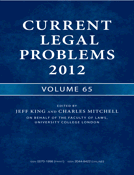
Current Legal Problems
Navigating the complexities of modern law.Current Legal Problems is a premier academic journal published by Oxford University Press, dedicated to advancing the field of law through critical analysis and interdisciplinary research. With an ISSN of 0070-1998 and an E-ISSN of 2044-8422, this journal has established itself as a vital resource for legal scholars and practitioners alike since its inception in 1983. Recognized with a Q1 category ranking in Law for 2023, it ranks notably in Scopus as #415 out of 1025, placing it in the 59th percentile, further underlining its influence and importance. The journal's scope encompasses contemporary legal issues, providing a platform for innovative legal thought and discussion. Although it does not follow an open access model, the journal remains accessible through both print and digital subscriptions, catering to a global audience from its base in Oxford, United Kingdom. Researchers, students, and legal professionals will find Current Legal Problems indispensable for staying informed about the latest legal developments and scholarly debates.

UNIVERSITY OF CHICAGO LAW REVIEW
Shaping the Future of Law Through Critical DiscourseUniversity of Chicago Law Review is a prestigious academic journal dedicated to advancing legal scholarship, published by the University of Chicago Law School. Renowned for its rigorous peer-review process and high editorial standards, this journal is recognized as a leader in the field of law, achieving a Q1 ranking in the 2023 category of Law and occupying a notable position within the Scopus rankings, specifically at #199 out of 1025 in the Social Sciences - Law category, placing it in the 80th percentile. The journal provides an essential platform for legal scholars, practitioners, and students to engage with cutting-edge research and theory across various legal disciplines, including constitutional law, criminal law, and comparative law. With a commitment to fostering critical discourse, the University of Chicago Law Review has been instrumental in shaping legal thought, making it a vital resource for anyone seeking to contribute to or understand the evolving landscape of legal studies. Although it does not currently offer open access, subscription options provide robust access to its extensive archive of scholarly articles since its inception.

Australian Journal of Competition and Consumer Law
Illuminating Legal Pathways for Consumers and BusinessesThe Australian Journal of Competition and Consumer Law, published by LAWBOOK CO LTD, stands as a vital resource for scholars, practitioners, and students in the fields of competition law and consumer protection. With its ISSN 1838-9260, this journal offers insightful analyses and critical discussions that delve into contemporary issues, trends, and emerging challenges within the realm of competition and consumer legislation in Australia and beyond. Although it does not currently feature Open Access options, it is designed to foster a deeper understanding of legal frameworks and economic considerations affecting consumers and businesses. The journal is notable for its commitment to academic rigor and relevance, making it an essential publication for those seeking to navigate the intricacies of law in today's dynamic marketplace.
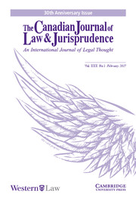
Canadian Journal of Law and Jurisprudence
Navigating the Evolving Landscape of Canadian LawCanadian Journal of Law and Jurisprudence, published by Cambridge University Press, serves as a pivotal platform in the field of legal studies, particularly recognized for its comprehensive exploration of jurisprudence in the context of Canadian law. While the journal operates without an open access model, its ISSN 0841-8209 and E-ISSN 2056-4260 ensure broad academic accessibility. Based in the United Kingdom, it has established a notable impact within its category, maintaining a Q3 ranking in Law according to the latest 2023 metrics. With its convergence of issues from 1996 to 2003, periods in 2007, and recently from 2012 to 2024, the journal embraces a rich historical context while addressing contemporary legal challenges. Ranked #439 out of 1025 in the social sciences category on Scopus, the journal is positioned within the 57th percentile, highlighting its significance and influence in legal scholarship. Aimed at researchers, professionals, and students, the Canadian Journal of Law and Jurisprudence is an essential resource for those seeking to deepen their understanding of the evolving landscape of law and its philosophical underpinnings.
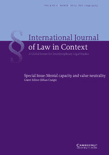
International Journal of Law in Context
Bridging Legal Theory and Real-World ContextsInternational Journal of Law in Context, published by Cambridge University Press, is a distinguished peer-reviewed journal that explores the intricate relationship between law and its cultural, social, and political contexts. With an ISSN of 1744-5523 and an E-ISSN of 1744-5531, this journal has established itself as a vital resource for legal scholars and practitioners. Operating from the United Kingdom, it has been actively contributing to the field of law since 2005, and is currently indexed in Scopus, ranking 317 out of 1025 in the Social Sciences Law category, placing it in the 69th percentile. Although it does not currently offer open access, the journal aims to provide insightful analyses and critical discussions relevant to contemporary legal issues and challenges. The 2023 Q3 category ranking further underscores its reputation in the legal academic community, making it a significant platform for researchers, professionals, and students interested in the contextual dimensions of law.

World Competition
Navigating the Complexities of Global CompetitionWorld Competition is a distinguished academic journal published by KLUWER LAW INT, focusing on the dynamic interplay between law and economics. With its ISSN 1011-4548 and E-ISSN 1875-8436, the journal aims to disseminate high-quality research that explores competitive markets, regulatory frameworks, and economic theory, therefore making significant contributions to the fields of Economics and Law. Situated in the Netherlands, the journal is strategically positioned within a vibrant academic milieu, ranking in the upper quartiles of both categories - Q3 in Economics and Econometrics and Q2 in Law as of 2023. The journal serves as a vital platform for researchers, legal professionals, and students keen on understanding the complexities of competition policy and economic regulations. While it does not offer Open Access options, it remains committed to rigorous peer review and scholarly excellence, making it an essential resource for anyone interested in the evolving landscape of global competition law and economics. With converged years from 2016 to 2024, the journal reflects contemporary issues and trends, ensuring its relevance in today’s fast-paced academic environment.
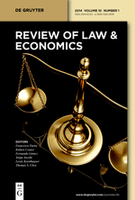
Review of Law & Economics
Fostering Insightful Dialogues on Legal and Economic Intersections.Review of Law & Economics, published by WALTER DE GRUYTER GMBH, serves as a pivotal platform in the intersecting realms of law and economics, with its open access policy initiated in 2016 to promote wider dissemination of research. Based in Germany, this journal aims to foster insightful discussions and innovative research that bridge the gap between legal frameworks and economic principles. With an impact factor reflected in its Q2 rank in Law and Q3 rank in Economics, Econometrics and Finance as per the 2023 category quartiles, it positions itself as a significant contributor to scholarly works in both fields. The journal's unique approach highlights a comprehensive analysis of legal issues through an economic lens, making it invaluable for researchers, professionals, and students alike. As it encompasses a broad spectrum of topics from regulatory analysis to market dynamics, the *Review of Law & Economics* continues to be a vital resource for those seeking to enhance their understanding and application of law in economic contexts, with converged years extending from 2005 to 2024.

Revista de la Facultad de Derecho
Championing Accessibility in Legal Education and ResearchRevista de la Facultad de Derecho is an esteemed open-access journal published by the Universidad de la República, Facultad de Derecho, based in Montevideo, Uruguay. Since its inception in 2007, the journal has committed itself to disseminating high-quality legal scholarship, covering a wide range of topics within the field of law. With a dedication to promoting academic dialogue and advancing legal research, the journal serves as a vital resource for researchers, legal professionals, and students alike. The publication aims to foster discussions on contemporary legal issues while providing a platform for interdisciplinary insights. The journal is accessible online through its ISSN 0797-8316 and E-ISSN 2301-0665, ensuring that its content reaches a broad audience across the globe. With a focus on accessibility and scholarly rigor, the Revista de la Facultad de Derecho plays a pivotal role in advancing legal education and research in Latin America.